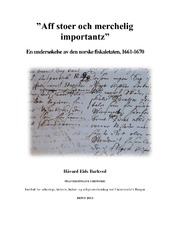"Aff stoer och merchelig importantz" - En undersøkelse av den norske fiskaletaten, 1661-1670
Master thesis
Permanent lenke
https://hdl.handle.net/1956/7619Utgivelsesdato
2013-11-20Metadata
Vis full innførselSammendrag
Ingenting er nevnt om sammendrag på samme skriftspråk som i oppgaven i dokument med tittelen "Retningslinjer ved innlevering av masteroppgave ved AHKR, UiB". Derimot er sammendrag på annet språk enn oppgaven påkrevd. The Fiscal Agency in Norway, 1661-1670 English Abstract Following the introduction of absolutism in Denmark-Norway in 1660, the office of generalfiskal ( fiscal general') was established as part of the new administration of the Rentekammer ( Exchequer'). The fiscal general was initially dependent on the generalprokurør ( procurator general') and directed to prosecute tax arrears, embezzlement of royal revenue, and erroneous financial records. To assist the fiscal general, a number of subordinate underfiskaler ( fiscal lieutenants') were established in the Danish provinces. A fiscal was appointed to supervise the Norwegian part of the realm in November 1661. At that point, fiscal general Søren Kornerup had directed his attention towards lèse-majesté, and through his efforts a framework of fiscal laws was discussed by a legal commission, which placed offenses against the sovereignty of the majesty under the supervision of the fiscal general. The dual role of the fiscal agency was reflected in the instructions given to the Norwegian fiscals. The first such instruction was received by fiscal Jacob Madsen in March 1663, and altogether omitted duties of financial auditing. Instead, it reflected Kornerup's obsessions with lèse-majesté. In the summer of 1663, two developments seem to have shifted the course of the Norwegian fiscal agency back to its originally envisioned function. At around the same time fiscal general Kornerup fell from grace, a new fiscal leader was appointed in Norway. He received new instructions in 1664. This time, duties pertaining to lèse-majesté were largely omitted in favour of supervision of income from tax and excise. However, the Norwegian fiscals remained responsible for prosecuting offenses against royal decrees relating to the judiciary and the administration. The duality described above has been the cause of disagreement amongst Norwegian scholars. The fiscal agency has alternately been described as either a secret police or an auditing agency, or both. In this dissertation, the author has attempted to clarify the intention, function, and practice of the Norwegian fiscal agency. The findings show that the Norwegian fiscals pursued both lèse-majesté and purely fiscal matters throughout the short period the officials operated in the country. The agency was abolished in 1670 due to its lack of profitability and the negative effects its practices caused.
